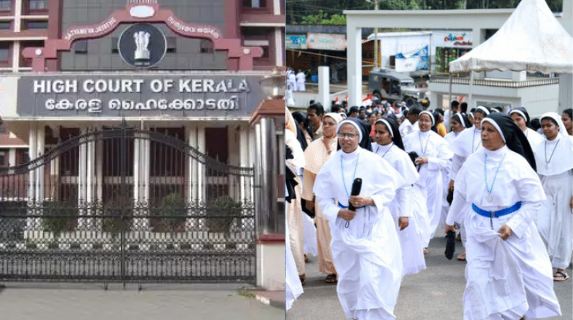In any democratic country, laws made by the legislature take precedence over religious and personal laws. Laws of the land supersede the laws of any religious community and their adherents, and this facet of democracy has been upheld by the Kerala High Court. In a matter which has been pending before it since 2014, the Court recently ruled that Christians nuns and priests are not exempt from the IT Act, and as such, have to pay income tax like any other ordinary Indian does. The court pronounced the verdict quoting the Bible verse, “Render unto Caesar the things that are Caesar’s, and unto God the things that are God’s.”
In 2014, the Income Tax Officers directed District Treasury Officers that TDS, that is, tax deducted at source must be effectuated even for employees who are members of religious congregations receiving salary from the government exchequer. According to Live Law, the appellants approached the court challenging the decision after this direction of the Income Tax Officers. Around 50 writ petitions were pending before the court ever since.
Now, the court has ruled that nuns and priests of Christian religious congregations and missionaries are liable to pay income tax, since their notion of “civil death” under ‘Canon Law’ is limited in its extent and in its operation. The petitioners contended that as per the canon law, once a perpetual vow of poverty is taken, the nun or priest, undergoes a civil death, and thereafter, they are not ‘persons’ under the Income Tax Act.
Canon Law is a set of rules which the Christian clergy and church organisations abide by. The Kerala High Court, however, made a scathing remark against the petitioners’ flimsy and opportunistic argument. It said that the concept of civil death propounded by canon law is not real. Nuns and priests are not entitled to have any income or hold any property and all their properties, assets including salary and pension, belong or accrue to the religious congregation.
In their order, Justice SV Bhatti and Justice Bechu Kurian Thomas said, “The said fiction under the canon law, cannot be extended to cover all situations in the life of a nun or a priest. It cannot be extended to cover situations governed by the statutes enacted by the legislature unless the same is recognized by the provisions of the statute. None of the provisions of the Income Tax Act recognize the concept of civil death. Thus, the concept of civil death has no application under the Income Tax Act.”
The court also added, “The legislation enacted by the legislature gains primacy and supremacy over the personal laws.” Interestingly, nuns and priests are ordinary Indians, who enjoy the same rights as we all do. They have perfectly normal lives, and their vow of ‘poverty’ under canon law is only symbolic in nature. As such, there is no reason why they should flash the canon law card only when it comes to paying income tax.
Intriguingly, the petitioners relied on circulars issued by the Central Board of Direct Taxes, or the CBDT, in 1944 as well as in 1977 to claim exemption from TDS. However, the Kerala High Court said that CBDT does not have the power to issue any circular excluding or exempting a person or a category of persons from the tax provisions. Hence, nuns and priests are now liable for TDS deductions.
The ruling has reinforced the belief that the law of the land will always determine the applicability and flexibility of religious and personal laws. The Kerala High Court has set a commendable precedence. Every Indian who can pay tax, must pay it. Claiming to be Indian and demanding all rights that come alongside being an Indian and yet not paying taxes is simply hypocrisy of the highest order.
